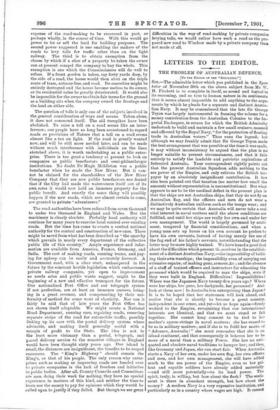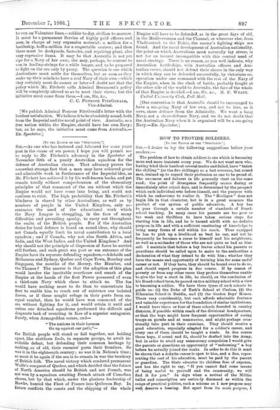LETTERS TO THE EDITOR.
THE PROBLEM OF AUSTRALIAN DEFENCE. [To THE EDITOR Or THE "SPECT1THE.1 Sin,—The admirable letter which you published in the Spec. tator of November 30th on the above subject from Mr. W. H. Pitchett is so complete in itself, so sound and logical in its reasoning, and so true to human nature in its sentiments that it seems almost impossible to add anything to the argil. ments by which he pleads for a separate and distinct Austra- lian Navy. It may be remembered that the late Sir George Tryon was largely instrumental in framing the scheme for a money contribution from the Australian Colonies to the Im- perial Exchequer, in return for which the British Admiralty undertook to build and maintain a few small cruisers, manned and officered by the Royal Navy," for the protection of floating trade in Australian waters." Thus runs the legend; but although we may frankly admit that Sir George Tryon made the best arrangement that was possible at the time it was made, it may without inconsistency be argued that the plan is no longer suitable to present circumstances, and that it fails entirely to satisfy the laudable and patriotic aspirations of federated Australia. Your correspondent rightly points out that the present Australian Squadron adds nothing to the sea power of the Empire, and only relieves the British tax- payer by an absolutely insignificant contribution. It has also been pointed out that taxation (no matter how small the amount) without representation is unconstitutional. But what appears to me to be the cardinal defect in the present plan is that the ships are not Australian ships, that they do not fly an Australian flag, and the officers and men do not wear a distinctively Australian uniform such as the troops wear; and we may be quite certain that Australia will never take a real vital interest in naval matters until the above conditions are fulfilled, and until her ships are really her own and under her own management. The world is largely governed by senti- ment, tempered by financial considerations, and when a young man sets up house on his own account he prefers to have his own servants, instead of having merely the use of the fag end of his father's servants, notwithstanding that the latter may be more highly trained. We have heard a good deal about the difficulties which present thanselves in the establish- ment of a distinct Australian Navy,—the impossibility of build- ing their own warships; the impossibility even of carrying out extensive repairs; of making guns, armour, &c.; and the absence of a staff of trained officers and instructors for educating the personnel which would be required to man the ships, even if they were built in England. Difficulties ! Impossibilities! Where was the Japanese Navy twenty-five years ago? Where were her ships, her guns, her dockyards, her personnel? And look at them now ! Is Australia less enterprising than Japan? It is to be hoped that her statesmen will look ahead, and realise that she is shortly to become a great country, independent in one sense, and yet—let us hope again—firmly wedded to the Empire, recognising that our international interests are identical, and that we must stand or fall together. She cannot long consent to be tied to her mother's apron-strings in naval matters; she has ceased to be so in military matters; and if she is to fulfil her motto of "Advance, Australia!" she must remember that she is an island continent, and that consequently it behoves her to be more of a naval than a military Power. She has no anti- quated and obsolete naval traditions to hamper her; and thus, like Germany and Japan, she can start fair. When Australia starts a Navy of her own, under her own flag, her own officers and men, and her own management, she will have added much to the sea power of the Empire, even as her gal- lant and capable soldiers have already added materially —and still more potentially—to its land power. The spirit, truly, is willing, but how about the flesh ? The senti- ment is there in abundant strength, but how about the money ? A modern Navy is a very expensive institution, and particularly so in a country where wages are high. It cannot
be run on Volunteer lines,— soldier to-day, civilian to-morrow. It must be a permanent Service of highly paid officers and men, in charge of very expensive material: a million for a battleship, half-a-million for a respectable cruiser; and then there must be dockyards, factories, and repairing plant, also very expensive items. It may be that Australia is not yet ripe for a Navy of her own; she may, perhaps, be content to run in leading-strings for a while longer, and to be prepared to fight on the sea only by proxy. The question is one which Australians must settle for themselves, but as soon as they make up their minds to have a real Navy of their own—which they certainly must do sooner or later—I doubt not that the policy which Mr. Fitchett calls Admiral Beaumont's policy will be completely atm ed so as to meet their views; but the initiative must come from them.—I am, Sir, &c.,
C. C. PENROSE FITZGERALD,
Vice-Admiral.
[We publish Admiral Penrose FitzGerald's letter with the liveliest satisfaction. We believe into be absolutely sound, both from the Imperial and the naval point of view. Australia, as a free nation within the Empire, should have her own Navy; but as he says, the initiative must Come from Australia.— ED. Spectator.]































































 Previous page
Previous page